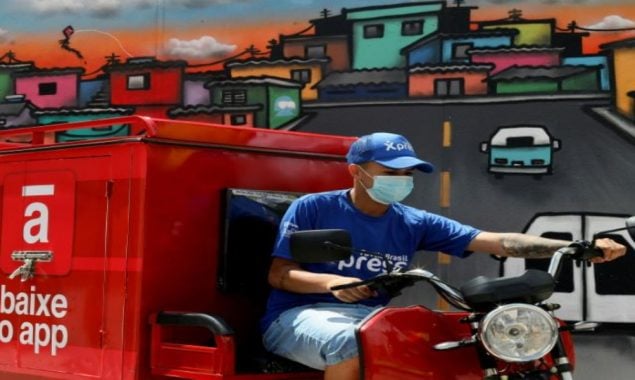Gwadar to be connected with national grid soon
ISLAMABAD: To meet the electricity requirement of Gwadar 132kV line has been...

Image: AFP
SAO PAULO: Clapping their hands, ringing bells and yelling at the top of their lungs to find the right recipient, delivery workers for Brazilian startup Favela Xpress dare to go where traditional companies won’t: the slums.
The firm launched in April in Paraisopolis, Sao Paulo’s second-biggest ‘favela’, a sprawling shantytown of 100,000 people with a maze of impromptu streets and no official address system.
Corporate delivery firms typically reject orders from here, citing safety reasons.
But resident and entrepreneur Givanildo Pereira, 21, says he decided it was time to “break down the invisible walls that separate poor communities from the urban fabric of our cities.”
The service has enabled favela residents to shop online from their home addresses for the first time, just as the coronavirus pandemic has made access to e-commerce more vital than ever.
“There is a lot of pent-up demand, because (traditional delivery services) always blocked Paraisopolis postal codes automatically as a high-risk area,” Pereira told AFP.
“When we deliver packages, we’re also bringing people dignity and a sense of belonging to society. They have the same right to receive a package at home as anyone else, without prejudice.”
Fast growth
Favela Xpress partners with traditional delivery companies to provide “last mile” service, gathering parcels at a distribution center at the edge of the favela and bringing them to recipients’ doors.
It uses a map developed during the pandemic by a network of Paraisopolis community leaders who wanted to help distribute food and other donations to residents, many of whom lost their livelihoods when the economy went into the Covid-19 shutdown.
Pereira, who has lived in the favela since childhood, made a point of hiring locals, tapping their knowledge of the neighbourhood, where house numbers follow no readily identifiable order.
The jobs came as welcome opportunities amid the pandemic.
At the Paraisopolis distribution center, 28-year-old Imael Silva Maia organizes deliveries of the appliances, tech equipment, toys and other packages stacked inside.
“I’m a tattoo artist by trade, but work dried up with the pandemic,” he says.
“I do a bit of everything here, sorting, logistics. I even make deliveries when I need to. We’re improved experts here.”
The company has been an overnight success: it currently delivers 1,800 parcels a day, for sales of around 200,000 reais ($36,000) a month.
It has some 300 collaborators, counting both employees and independent delivery workers.
It has expanded from Paraisopolis to six other favelas, including Rocinha, in Rio de Janeiro, the biggest favela in Brazil, with nearly 26,000 households.
Some of Brazil’s top retail chains have partnered with Favela Xpress to reach previously inaccessible clients.
Recently, the firm also became the first from the favelas to launch a crowd-funding campaign to raise capital.
Accepting contributions as small as $2, the company now sells shares to investors in exchange for a slice of its quarterly profits.
It is looking to raise around $235,000 and expand to a total of 50 favelas by 2023, with 1,500 workers.
The potential is huge: Brazil’s 13,000 informal settlements move an estimated $30.5 billion a year, according to advocacy group G10.
Favela stock exchange
The crowd-funding campaign has been compared to a sort of “favela IPO”, the initial public offerings large companies make when they debut on the stock exchange.
Investors make their payments via the platform DIVIhub, which carried out a viability study of the business before the launch.
DIVIhub’s executive director, Ricardo Wendel, urged Brazilian financial regulators to now clear the way for “an organized secondary public market, a sort of ‘favela stock exchange’ where people can buy and sell shares.”
That proposal, which is currently up for discussion in public hearings, is close to becoming a reality.
Wendel’s team has identified 18 companies that could be traded on the “favela stock market” when it opens.
Pereira is; meanwhile, dreaming of turning his company into the first favela “unicorn,” the term for start-ups valued at more than $1 billion.
Catch all the Business News, Breaking News Event and Latest News Updates on The BOL News
Download The BOL News App to get the Daily News Update & Follow us on Google News.